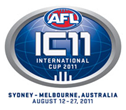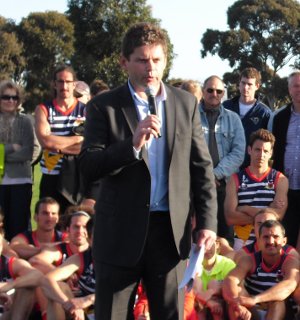Looking back - a review of IC11 with Tony Woods
- Friday, December 23 2011 @ 06:52 am ACDT
- Contributed by: Brett Northey
- Views: 5,561

 As the 4th AFL International Cup slips away to now being several months ago we thought it time to chat to the AFL International Development Manager Tony Woods about how he thought the tournament played out, ranging from questions on media, the women's division and staging it across two cities, to his own personal highlights of the experience.
As the 4th AFL International Cup slips away to now being several months ago we thought it time to chat to the AFL International Development Manager Tony Woods about how he thought the tournament played out, ranging from questions on media, the women's division and staging it across two cities, to his own personal highlights of the experience.
WFN: Overall I assume you were pretty happy with IC11. A record 18 men's teams including 3 new ones (Tonga, Fiji and France) and only 3 countries that have attended in the past were not there (Samoa, Finland and Spain), which given the status of international footy is a very good return rate. And of course the inaugural Women's Division with 4 nations and the Australian indigenous and multicultural (AIM) team. Particularly pleasing must've been having all the committed nations turn up... no late withdrawals or no shows in 2011.
WFN: It seemed that needing 2 divisions for the men had become obvious after some huge blow outs in past Cups, and you used a lightning carnival on day 1 to rank the teams into the two groups. Personally I enjoyed it and think it gave all nations a fair go. Were you happy with the way that played out?
Tony Woods: Absolutely and on a whole range of levels. Hopefully we can build on the number of women teams for 2014.
WFN: If there was one downside it might be the lack of competitiveness of the Australian indigenous and multicultural side. Did the AFL misjudge the international teams when selecting the AIM squad, or are we missing the point of it? My assumption was that the team was picked to promote the game in those communities and not dominate the tournament, but still provide good competition.
WFN: There's a lot of quality indigenous and multicultural women playing footy in Australia, do you think this concept will be repeated in future, and if so do you think there will be a focus on making it stronger?
WFN: The official events associated with the tournament seemed to be bigger than before, with the opening night at Luna Park in Sydney, the morning tea at the Prime Minister's Sydney residence, Kirribilli House, the closing function at Crown Palladium, as well as a visit from the Victorian Premier. Pulling all of those together must've been pleasing and helped raise the profile. But still, the mainstream media seem a little reluctant, were you happy with the overall coverage?
Tony Woods: I thought the overall coverage was excellent particularly the Sydney component. The reality is the International Cup is an emerging event with amateur participants from developing football nations, and it is competing within the midst of the AFL season. I think we have come a long way since its inception and it will continue to build in profile.
WFN: On a personal note, it was your first International Cup since taking up the International Development Manager position. I don't think you'd seen the previous Cups. How did you find the whole experience? Was it what you expected? Was there a personal highlight, besides perhaps the primary goal which is always to make sure all the nations turn up?
WFN: Did the AFL seek feedback from the nations post-IC11? If so was the response generally positive? Any common themes?
WFN: In the past the AFL has suggested the International Cup host city could be anywhere in the world, and although it has been co-hosted (e.g. Sydney this time), Melbourne has always featured prominently. Do you expect this to continue for the next International Cup? Can we assume 2014 is locked in as the year?
WFN: How do you see the tournament progressing in future? Presumably more teams and the standard continuing to increase. Do you see a way for the crowds to grow and the event to become a bigger focus on the sporting calendar for Australians?
Tony Woods: In my view we are on the right trajectory and the standard should continue to improve. As we work to elevate the profile of International AFL through our growing activity off shore, the introduction of International Combines, increased outbound tours into targeted regions and in time, a couple of international players breaking through onto AFL lists, the profile of International Football in the domestic market will rise. With this should come increased profile of IC14. We are also looking at some minor changes to the itinerary which will hopefully allow more curtain raisers played.


 RSS news
RSS news Twitter
Twitter Facebook
Facebook